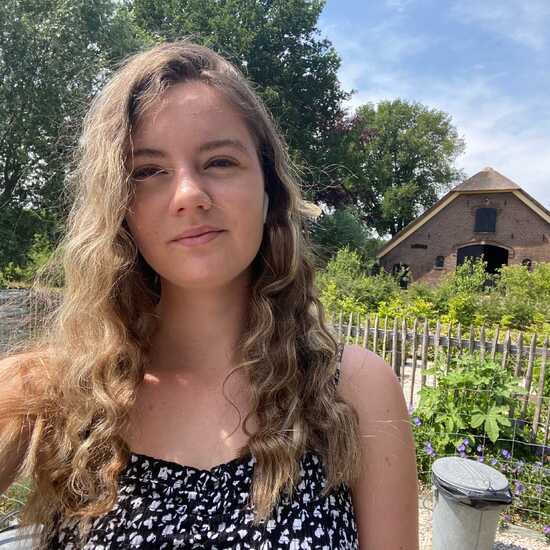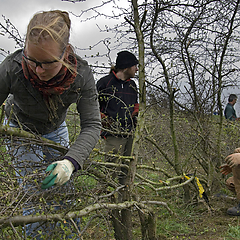Tessel has been interning at the Dutch Centre for Intangible Cultural Heritage since February. In her research, she focuses on urban greening, with a special emphasis on community gardening. Tessel explains, "There is little awareness of the many sustainable benefits that community gardening can bring."
Tessel Meulemans. In her research, she focuses on urban greening
Social importance of community gardens
"Currently, I have been interning here for about three months," Tessel says. Her thesis research at KIEN focuses on community gardening. Tessel explains, "Community gardening is indeed a form of intangible cultural heritage (ICH). However, my preliminary research revealed that previous studies on community gardening paid little attention to the fact that community gardening is ICH. Therefore, I decided to focus my research on the personal and social aspects of community gardening." She chose this focus, she says, "to learn more about the importance of community gardening for the gardeners."
But there is more to Tessel's research on community gardening. "Community gardens are located on expensive land that could be used for other purposes, such as housing. As a result, some community gardens are under pressure from municipalities. Therefore, the goal of my research is also to gain more insight into the social importance of community gardening. This knowledge could potentially play a role in supporting the overall importance of community gardening."
Community gardens: not just popular among retirees
Tessel is focusing her thesis research on community gardeners in Rotterdam. Currently, Tessel is actively interviewing these community gardeners in Rotterdam. She hopes to speak to a total of 20 gardeners for her thesis research. Tessel says, "In the interviews I have conducted so far, it has become clear that for many of the community gardeners, the social aspect of community gardening is of great importance. This includes brief conversations while passing by other plots, sharing cuttings, and enjoying a drink together in the clubhouse after gardening."
Another finding from Tessel's internship research is that the perception that community gardening is only for retirees is incorrect. "The diversity within the two associations I visited is significant on all possible aspects," says Tessel. "Furthermore, most gardeners I have spoken with indicate that their community garden is a place for them to connect with people they would otherwise likely not meet. There is talk of a sense of community and a piece of solidarity that they miss elsewhere in society."
Plans for the future
As for what Tessel hopes to do after her internship and studies? She keeps her options open. "Personally, I don't know yet what the future holds for me," she says. "After my internship, I will look for a job in the field of societal issues. However, I have broad interests, so I don't rule out that other opportunities may arise for me."
Do you have any questions for Tessel? She will be interning at KIEN until the end of June. You can reach her through our general email address info@immaterieelerfgoed.nl. You can also follow Tessel on LinkedIn.
More (sustainable) intangible cultural heritage?
Below you can find a selection of the many forms of intangible cultural heritage that directly deal with sustainability. In our Inventory of Intangible Cultural Heritage, you will find a comprehensive overview of the more than 250 different forms of intangible cultural heritage that have been reported to KIEN so far.




